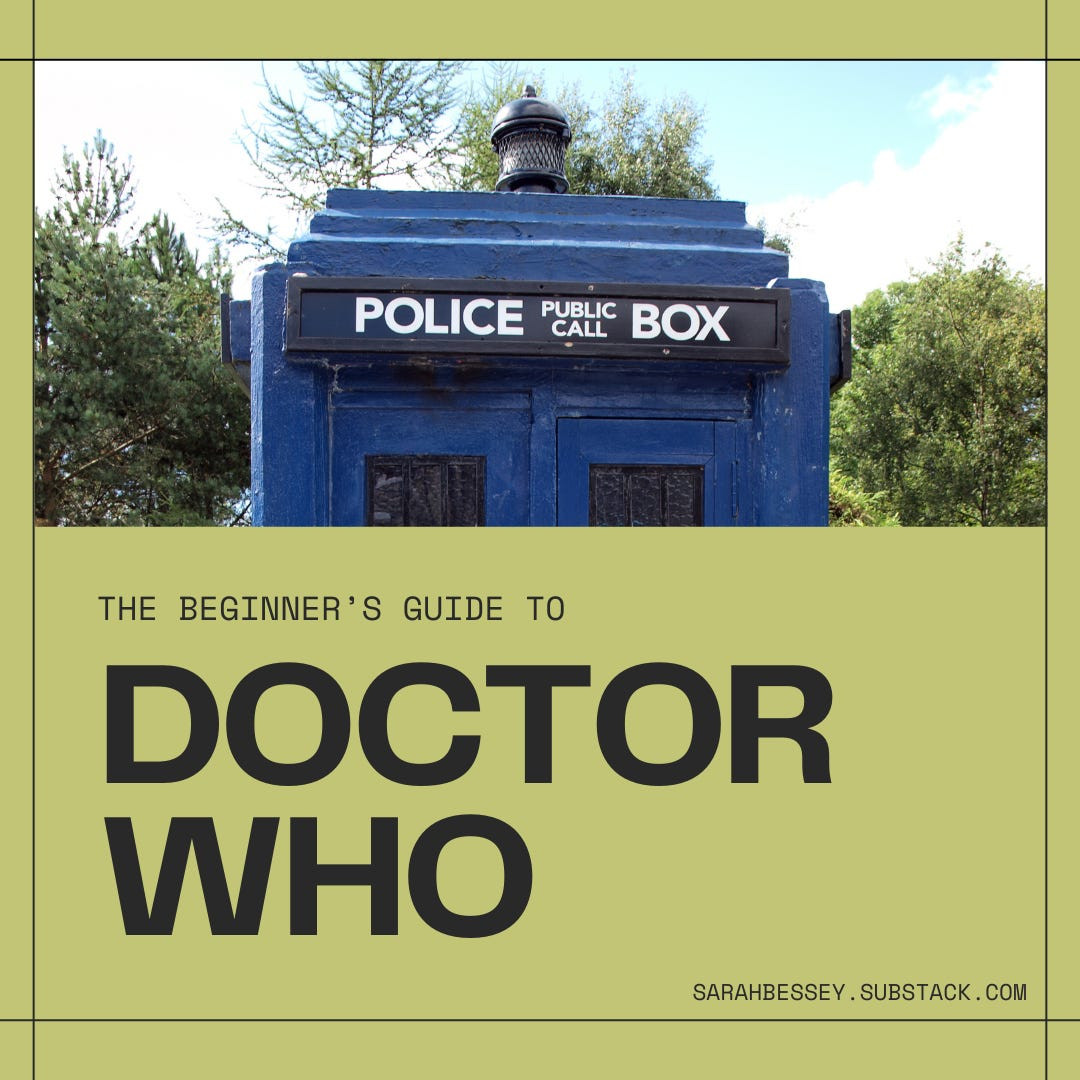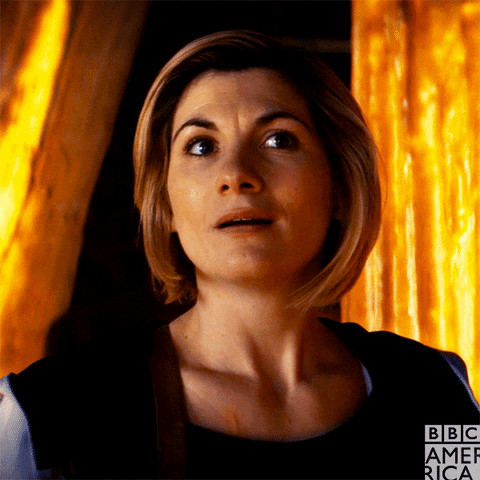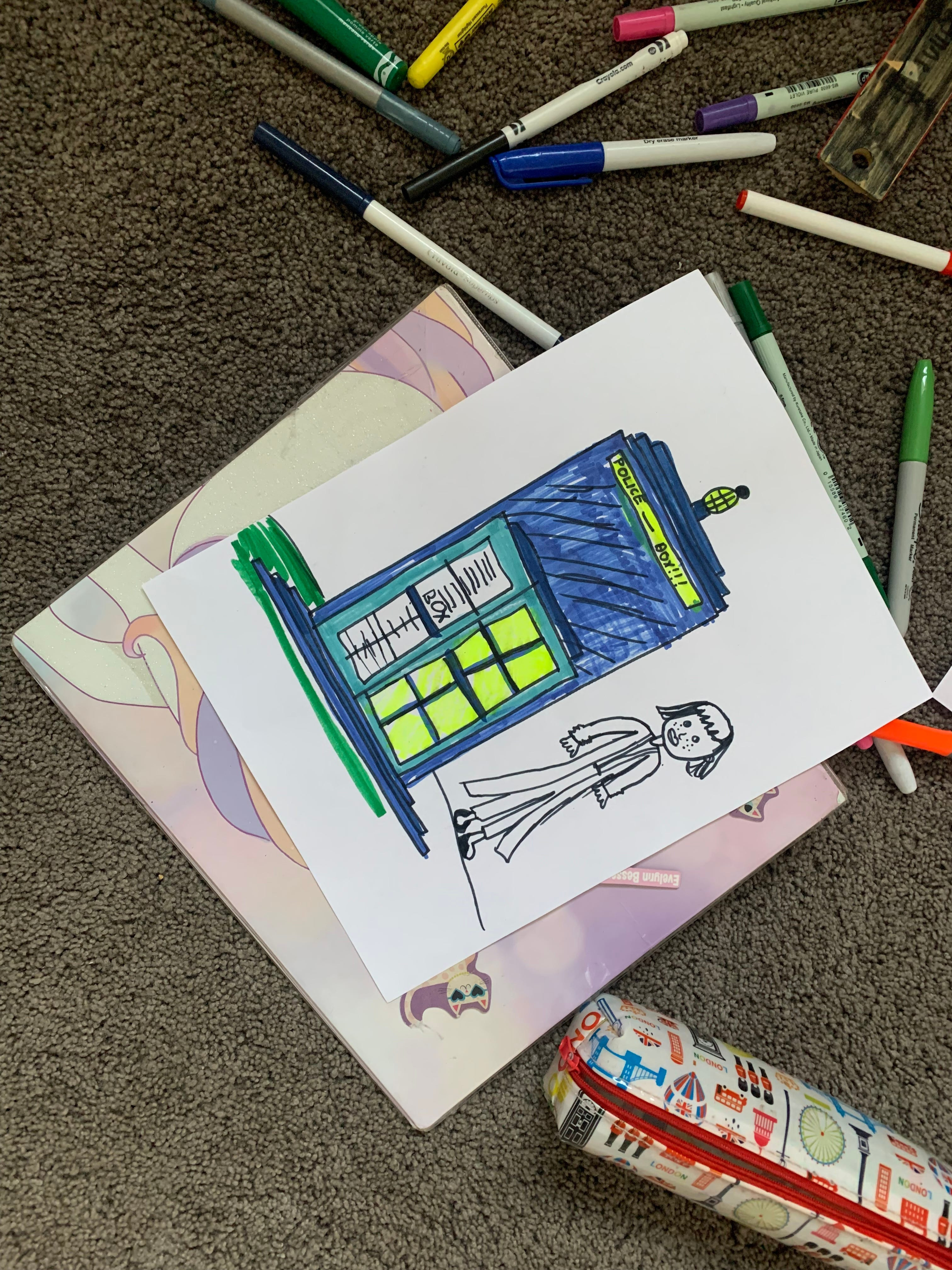Hey there, friends!
With the excitement around the new era of Doctor Who, bringing fresh stories to both longtime fans and newcomers, I figured it’s the perfect moment to share something I’ve been wanting to create for ages: a comprehensive guide to get you started with Doctor Who. Consider this your permanent launchpad into the Whoniverse!
So, you’re curious about watching Doctor Who but feel lost? Maybe you’ve tried an episode or two and just didn’t “get it”? Or perhaps you’re completely new and wondering where to even begin watching this legendary series? You’re in the right place. This beginner’s guide is for you.
 The Doctor Who logo, a swirling vortex of colors
The Doctor Who logo, a swirling vortex of colors
Now, if you’re thinking, “Wait, I thought this website was about something else!” Stick with me! Even if you usually come here for different topics, give this a chance. You might just discover a new passion. Or, if Doctor Who isn’t your cup of tea, feel free to explore other content – no hard feelings!
But for those ready to dive into the world of the Doctor, allons-y!
 A GIF of the TARDIS materializing in a burst of light
A GIF of the TARDIS materializing in a burst of light
It’s no secret that I’m a massive Doctor Who fan. Everyone has something they’re irrationally passionate about, and for me, it’s this incredible show. It’s like that feeling of loving what you love, no matter how quirky it might seem to others. And my “soft animal part” truly loves this show.
 A GIF of the Eleventh Doctor, Matt Smith, making a funny face with crossed eyes
A GIF of the Eleventh Doctor, Matt Smith, making a funny face with crossed eyes
Here’s a confession: I’m not typically a huge sci-fi genre enthusiast. I lean more towards period dramas or cozy baking shows than spaceships and aliens. From Star Wars to Star Trek, much of it leaves me cold. However, years ago, stuck at home with sick kids, I decided to watch a couple of Doctor Who episodes to see what all the hype was about. Big mistake! Just kidding – best decision ever! I was hooked within a season. Over a decade later, I’m still obsessed, ready to evangelize about this amazing British TV show. So, let’s get you recruited too!
What Exactly is Doctor Who?
Doctor Who is a BBC television program that first aired way back in 1963. Yes, that means over 60 years of history! No wonder it feels daunting to jump in. The show is generally divided into two main periods: Classic Who, which ran from 1963 to 1989 (before being cancelled), and the Reboot, often called New Who, which triumphantly returned in 2005 and is still going strong today. While once a cult favorite, Doctor Who has surged into mainstream popularity in recent years. The latest season has just premiered, introducing a fantastic new Doctor, sparking renewed interest – hence this guide for watching!
Essentially, it’s a vast, sprawling universe with a dedicated fanbase that rivals even the most passionate groups. At its heart, Doctor Who explores universal themes: wonder, goodness, suffering, choice, friendship, love, war, hate, belief, and curiosity. These themes often intersect with spirituality and faith throughout its compelling storytelling, making it more than just your average sci-fi show.
What’s the Story of Doctor Who?
On the surface, Doctor Who is about the Doctor and their companions traveling through time and space, having incredible adventures. But dig a little deeper, and you’ll find it’s fundamentally a story of hope, goodness, and the profound significance of our personal narratives. It champions doing what’s right, standing up for your beliefs, and navigating complex moral landscapes in an ever-changing universe. And yes, sometimes, it’s just pure, fun escapism. Doctor Who can be thrilling and terrifying, hilarious and absurd (like, say, “Space Babies!”), thoughtful and moving, beautiful and utterly heart-wrenching. Yes, heart-wrenching – get ready for emotional investment!
The show is clever, well-written, intricate, and deeply soulful. One of its strengths is how interconnected everything is. Small details, hints, slow-burn storylines, Easter eggs, and recurring jokes weave throughout the entire series. The more you watch Doctor Who, the richer and more rewarding the experience becomes.
Doctor Who is undeniably a wildly entertaining romp through time and space. It’s quirky, funny, and often brilliant. But it also delves into the deeper aspects of the human condition: our grappling with belief and faith, our experiences of suffering and joy, our curiosity about the vast universe, and how we are shaped by our choices, experiences, and most importantly, by love and connection. The underlying message is that everyone is inherently important (“In 900 years of time and space, I’ve never met anyone who wasn’t important”) and that all life is sacred. Watching Doctor Who often enhances your sense of wonder and curiosity about the world around you.
As the Doctor wisely says, “We’re all stories in the end. Let’s make it a good one, eh?”
Do You Need to Begin with Classic Doctor Who?
Absolutely not! Once you’re immersed in Doctor Who, you might become curious and want to explore some of the iconic stories from the past. (Though, realistically, even if you wanted to start from the very beginning, many early episodes are sadly lost or believed to be destroyed.) So, no, you absolutely do not need to watch 60 years of television to start watching and enjoying Doctor Who. Keep reading; I’ll provide three excellent entry points into the fandom.
Who is The Doctor?
First things first: The Doctor’s name is not actually “Doctor Who.” They are simply known as The Doctor. It’s a title that has become their name.
And… they’re an alien. Yes, an alien! Stay with me. The Doctor is a Time Lord from the planet Gallifrey. They have two hearts and appear human (though they’d argue humans look like Time Lords since Time Lords came first, naturally). They are incredibly old by human standards – currently, the Doctor is thousands of years old, depending on how you track time within the show’s complex canon.
Not only are they a Time Lord, but they are the Last of the Time Lords. Time Lords perceive time non-linearly; they experience all of time and space simultaneously. They see everything that was, is, and could be. They were once guardians of time itself. Being the last of their kind profoundly shapes the Doctor’s decisions, their deep empathy, and their profound respect for all life.
The crucial thing to understand about Time Lords is regeneration. When the Doctor is mortally wounded or reaches the end of their natural life (which takes a very, very long time), their entire body renews, transforming them into a completely new person. This is why we refer to “the Twelfth Doctor,” “the Ninth Doctor,” and so on. There are literally different incarnations of the Doctor, each portrayed by a different actor. This brilliant concept keeps the show fresh and exciting. Every few years, the actor playing the Doctor departs, and we are introduced to a new Doctor with a new face, personality, and temperament.
Be warned: you will become deeply attached to each Doctor and likely experience some grief during regenerations, only to quickly fall in love with the new one just as much. You might even develop an irrational fondness for one Doctor in particular, forever referring to them as “My Doctor” – the one who sets your personal standard.
We don’t know the Doctor’s “real” name. We only know the name they chose for themselves, a name that embodies a promise: “Never cruel or cowardly, never give up and never give in.” Because of this chosen identity, the Doctor often inspires people to become “better” in all senses of the word. Subtle hints and later confirmations suggest the Doctor has endured immense suffering and loss, outliving loved ones and carrying deep emotional scars. They’ve alluded to being a father, “but not anymore.” They are shaped as much by sorrow and loss as by wonder and joy.
Steven Moffat, former showrunner for the Eleventh and Twelfth Doctors and a frequent writer, perfectly encapsulates the essence of the Doctor:
“When they made this particular hero, they didn’t give him a gun, they gave him a screwdriver to fix things. They didn’t give him a tank or a warship or an x-wing fighter, they gave him a call box from which you can call for help. And the didn’t give him a superpower or pointy ears or a heat ray, they gave him an extra heart. They gave him two hearts. And that’s an extraordinary thing; there will never come a time when we don’t need a hero like the Doctor.“
What’s the Deal with the Blue Police Box?
That iconic blue police box is called the TARDIS, an acronym for Time And Relative Dimension In Space. It’s the Doctor’s time machine and spaceship, allowing travel through time and space. The Doctor’s adventures began when they stole this TARDIS from their home planet Gallifrey and ran away. The police box disguise is a funny accident. The TARDIS has a “chameleon circuit” meant to disguise it to blend into any environment. When the Doctor first landed it on Earth in 1960s Britain, the circuit malfunctioned and got stuck in the shape of a police box, which were common at the time. And so, it’s been a blue police box ever since.
The TARDIS is much more than it seems; it’s dimensionally transcendental. It’s famously bigger on the inside. No one truly knows how big it is. The TARDIS is also sentient. As you watch Doctor Who, you’ll see it plays a significant role in where and when the Doctor lands. They have a symbiotic relationship. The TARDIS boasts not only a constantly changing control room but also rooms like a swimming pool, a library, and even some mysterious, shadowy corners.
Who is the Person Traveling with The Doctor?
These companions, as they’re called, are usually – but not always – human. Initially, they served as audience surrogates, someone for viewers to identify with and ask questions within the TARDIS. However, they’ve evolved into fully realized characters with their own motivations, backstories, and intelligence. They can be the Doctor’s conscience, drive the plot, instigate action, cause trouble, or provide grounding.
The Doctor has a particular fondness for Earth, often seeing themselves as its protector. The companions’ relationships with the Doctor are complex, and their families back home often have an even more complicated relationship with this time-traveling alien. Viewers become as invested in the companions and their families as they do in the Doctor. A strength of Doctor Who is the rich character development of the companions – they grow and change profoundly throughout their journeys. Since the reboot, you could argue that the companion is almost a co-lead. Some companions fall in love with the Doctor, others become best friends, and some are just companions for a shorter period. It’s clear the Doctor has favorites too, even while appreciating a diverse range of companions. I can’t say much more without venturing into spoiler territory!
Is Doctor Who Just About Fighting Aliens?
Absolutely not. The Doctor is fundamentally pro-life and peace-loving, more fascinated by the new and different than repulsed by it. When the Doctor has enemies, it’s usually because those individuals or species violate these core values. The Doctor is inherently curious about alien life and holds a deep respect for it.
So, the iconic enemies like the Daleks aren’t villains simply because they are alien. Not at all. (In fact, the Doctor has often clashed with humans over our tendency to react with fear and violence to the unknown.) Daleks are antagonists because they are consumed by hatred for anything not like themselves and seek to impose uniformity on the universe’s beautiful diversity.
Aliens are just one facet of Doctor Who. You’ll be surprised how quickly you accept the existence of a vast universe. Just as often, the Doctor encounters historical figures, navigates past events, confronts sinister humans, or deals with natural disasters across time and space. One of the show’s remarkable talents is taking ordinary objects or everyday scenarios and twisting them just enough to make them unsettling and ominous (you’ll never look at statues or earpieces the same way again!).
Is Doctor Who a Show for Kids?
Yes and no. It was initially conceived as a children’s program. However, in the rebooted series, it’s more of a family show that often delves into themes and scenarios that can be quite scary for younger children. I personally waited until my kids were around ten or eleven before introducing them to it. You do need to embrace the aspects that are kid-friendly – the silliness and lighthearted moments. Which, again, is something most Whovians adore. The show can swing from terrifying to hilarious within moments. But because there’s always a possibility of children watching, Doctor Who generally avoids explicit violence, swearing, or sexual content to convey its stories – which is something many viewers appreciate.
 A child's drawing of Doctor Who characters, including the TARDIS and DaleksThis drawing by my child, Evelynn, from when she started watching the show, captures the fun of Doctor Who for families. It’s become a wonderful family tradition for us. While all my kids enjoy it, my son Joe is just as obsessed as I am! My daughter Maggie is eagerly waiting for her turn to fully dive in.
A child's drawing of Doctor Who characters, including the TARDIS and DaleksThis drawing by my child, Evelynn, from when she started watching the show, captures the fun of Doctor Who for families. It’s become a wonderful family tradition for us. While all my kids enjoy it, my son Joe is just as obsessed as I am! My daughter Maggie is eagerly waiting for her turn to fully dive in.
Okay, You’ve Persuaded Me. Where Should I Start Watching?
There are several great ways to begin your Doctor Who journey. Here are three recommended starting points:
1. The Fifteenth Doctor Method
Since we’re in a brand new era of Doctor Who with the Fifteenth Doctor, this is honestly a perfect time to jump right in with the current season. You don’t need to know decades of backstory to enjoy it and decide if it’s for you. The show anticipates new viewers joining now, so they’ll naturally explain essential elements as you go. If you enjoy the show’s vibe, you can then explore Method 2 or 3, either alongside this season or afterward.
Currently, there are three episodes available (The Church on Ruby Road, Space Babies, and The Devil’s Chord) on Disney Plus or BBC iPlayer. We have a delightful and charming new Doctor and a captivating new companion, Ruby Sunday, with a mysterious background. Plus, with increased production budgets, the special effects are vastly improved. You’ll quickly grasp the show’s wonderfully bonkers nature, even as they’re setting up storylines for the future. (Pay attention to little details; Doctor Who loves to bring back seemingly minor moments later on.)
2. The 2005 Reboot Method
Start right from the 2005 reboot with Series/Season 1, Episode 1, titled Rose, and watch straight through, episode by episode. This is how I started with the Ninth Doctor, so it holds sentimental value for me.
However, be warned: if you struggle with very cheesy special effects, over-the-top silliness, and the idea of potentially catching up on over twenty years of television, this method might not be for you just yet. In the 2005 reboot, the budget was quite limited initially. For viewers accustomed to modern, high-budget TV, the early effects can be a bit jarring.
Personally, I almost gave up early on – I think it was the farting aliens in Downing Street that nearly made me quit – but around the eighth and ninth episodes (The Empty Child and The Doctor Dances, a brilliant blend of love, fear, creepiness, and beauty), I fell head over heels for the show. But not everyone makes it that far. So, it’s a slightly riskier starting point but will provide you with the complete backstory for everything that follows. And bonus: it introduces you to David Tennant’s phenomenal Tenth Doctor.
3. The One-Off Episodes and Eleventh Doctor Start Method
This approach is particularly recommended for those who have tried Doctor Who before but didn’t connect with it. It’s also great for anyone unsure about committing to a show with such a long history and just wants to get a feel for what it’s all about.
Here’s the plan: Watch the episode Blink from Series 3, Episode 10 (2007). It features the Tenth Doctor and his companion, Martha, but it’s largely a standalone episode and considered one of the best early episodes of the reboot. It clearly demonstrates the show’s essence and how time travel works, even though the Doctor isn’t heavily featured. Then, watch Vincent and the Doctor from Series 5, Episode 10 (2010) with the Eleventh Doctor. This episode is incredibly moving and showcases the emotional depth the show can achieve.
Enjoyed those? Now, jump to Series 5, Episode 1, The Eleventh Hour (2010), which introduces the Eleventh Doctor and his companion, Amy Pond. This marked another new era, much like now, and was designed to be more accessible to new viewers. This is the method I used with my husband, who initially couldn’t get past the “cheese” of the initial reboot.
I’ve yet to see anyone try this method and not become a Whovian, typically then going back to Series 1, Episode 1, and embracing it all. (I haven’t suggested Classic Who as a starting point because that’s for a more niche audience, but if that’s you, go for it!)
Where Can You Watch Doctor Who?
To watch the newest episodes with the Fifteenth Doctor, you can find them on Disney Plus in North America and on BBC iPlayer in the UK.
Currently, older seasons are available on Amazon Prime and HBO Max. (Classic Doctor Who is also on BritBox.) Availability may vary depending on your region, so check your local streaming services.
Personally, I own all the seasons on Blu-ray – a bit old-school, I know, but I love physical copies with bonus features! When I first started watching, I simply borrowed DVDs from the library one after another, which is a budget-friendly and low-commitment way to begin your watch doctor journey – your journey of watching the Doctor, that is!
Okay, that’s probably more than enough to get you started! I have so much more I could say, but this should be a good launching point.
I’ll be around in the comments for the next few days, so if you have any other questions, just ask! See you there!
Dreaming of impossible things,
S.
Website | Books | Field Notes | On Instagram | On Facebook | On Threads
